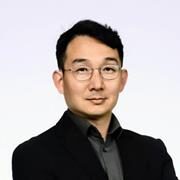Jeff Chen (CivE 2T4) works hard to get excellent grades — but being at the top of the class is not his main motivator.
Instead, over the past four years, he’s fallen in love with the processes of learning and self-improvement, he says.
“I’ve always prioritized academics quite heavily,” says Chen. “In my first year, I spent a lot of time anticipating the marks I would need to get a 4.0 GPA. I stopped doing that in second year and cared more about the effort I put in to get the result.”
The civil engineering student receives his undergraduate degree this June, achieving 100% in 17 of his 46 courses, which gives him a 96.5% average overall. As a result, he will be graduating with the highest grades among his cohort of graduates from within U of T Engineering and across U of T’s three campuses.
This distinction makes him the 2024 recipient of the John Black Aird Scholarship, which is awarded annually to the top student from an undergraduate degree program from U of T. He is also receiving a Governor General’s Silver Medal for his excellent academic record.
“This honestly wasn’t something I was expecting but I am immensely grateful,” says Chen. “I am treating these awards as a culmination of four years of hard work.”
When it came to his course work, Chen’s process was methodical. Every morning, he would wake up and write up a list of what he wanted to accomplish that day. Each item would be small, such as studying lecture notes for 15-minute increments. He also preferred to spread his assignments and projects over many days.
“I found that breaking things up helped me not get distracted and everything was continually fresh in my mind,” he says.
Chen would bring this same energy to his pastimes, which include playing chess, hiking and working out.
“My hobbies allow for me to set and fulfill goals in the same way I approach my academics,” he says. “I’ve recently gotten into powerlifting, and I always aim to hit higher weights for the squat, bench and deadlift.”

One of Chen’s academic highlights was working on his fourth-year thesis, which used deep neural networks, a form of artificial intelligence, to predict the seismic response of nonlinear structural systems.
“Nonlinear structural system refers to the fact that structures exhibit nonlinear stress-strain behaviour under strong forces,” says Chen. “Under an earthquake, dynamic forces on the structure are often strong enough that they enter this nonlinear range, which has complex, difficult-to-predict behaviour.”
This work was supervised by Professor Oh-Sung Kwon (CivMin) and began when Chen received an undergraduate summer research award from the Natural Sciences and Engineering Research Council of Canada (NSERC).
“The thesis project was completely open-ended and self-directed, unlike my course work, where outcomes are determined by the professors,” he says.
“I got to explore the intersection between artificial intelligence and structural engineering, and how we can utilize deep neural networks to design better and more resilient structures in the case of disasters.
“I really enjoyed the challenge of working on this research, so I spent a lot of time on it.”
In the fall, Chen will begin his next academic challenge as an incoming JD student at Berkeley Law in California. He says he is locked in, that is, staying focused on his goals as he looks forward to his first year of law school, where he will gain foundational legal knowledge before committing to an area of law. He also hopes his experiences will inspire other students to “lock in” and enjoy the journey of higher learning.
“U of T has opened many doors for me and there are many paths I can take going forward,” he says.
“I am keeping my options open, but I know my engineering degree will be useful, especially if I go into intellectual property law, since working on patents can be very technical.”





